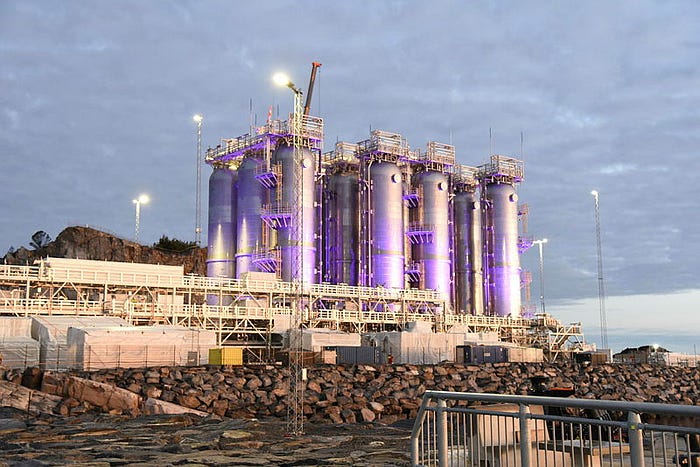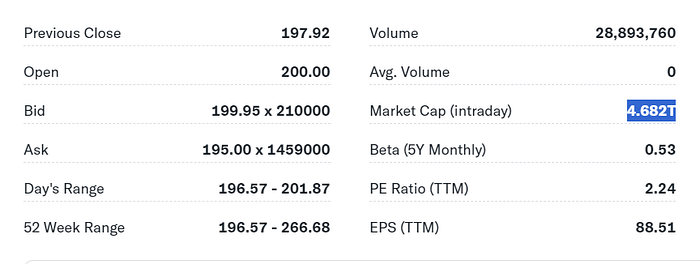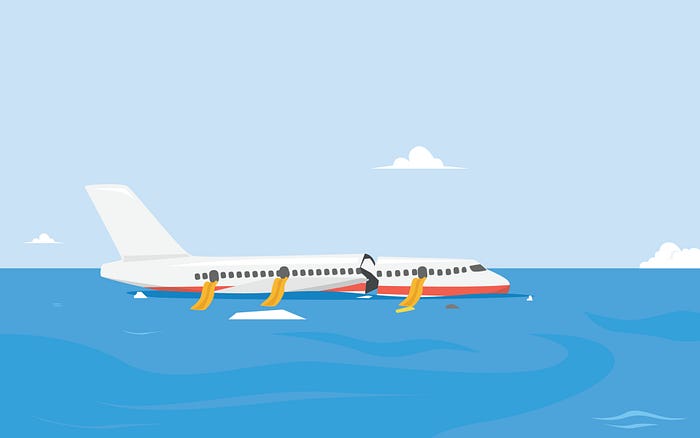It happened twice.
In two months.
In April, a gas leak at Equinor's Hammerfest LNG plant in Norway caused European gas prices to spike. This Monday, European natural gas prices reached their peak for the year following an outage at Norway's Nyhamna gas processing plant.
When Norway sneezes, Europe catches a cold.
In a hurry to replace Russian gas following the Kremlin's decision to use Gazprom as a weapon of war, Europe turned to Norwegian gas. At its peak, Russia supplied around 35% to 40% of Europe's gas. Fast forward to today, and Norway accounts for nearly 30% of Europe's gas market.
One Norwegian company, Equinor, is doing the bulk of the heavy lifting. "Of the more than 109 billion cubic meters of natural gas Norway exported to Europe last year — enough to power Germany until 2026 — roughly two-thirds was marketed and sold by Equinor."

To this very day, I find it hard to believe that the fate suffered by Gazprom is entirely of its own making. Russia's leading gas producer, a company that once sat at the top of the world and that Russia once proudly said would be its first trillion-dollar company, tried to participate in Putin's war against Ukraine by manipulating its gas supplies.
They choked gas supplies to Europe as the Kremlin weaponized gas, trying to keep Germany and other nations under pressure to stay away from helping Ukraine in the first year of the war. They purposely kept storage low and threatened to cut off supplies. At one point, they did stop the supply entirely.
Instead of throwing Ukraine off the trail, Germany and other European nations threw Gazprom off the trail. Alternatives were found. Substitutes came into the mix. Storage units became top priority items. The once choked gas supply to Europe never recovered. By 2023, no one in Europe was dependent on Russian gas, and no one wanted Gazprom to supply them.
A study conducted by Gazprom says it will be 2035 before they recover, needing at least a decade, provided they find alternative buyers. It was a sobering indictment of the Kremlin's policy to use gas and Gazprom as a weapon of war.
They did, and now they are paying the price.
After watching the plight of Gazprom and their unending struggle to find buyers, the Chinese government is playing hardball with them. "Can we build a Trans-Siberian pipeline to transport gas?" the Russians ask.
The response is: "Oh, yes. Maybe. We are not sure. Ah, we are sure. Maybe not. Let's talk about it".
Have I confused you enough?
Good.
Because that is exactly what the Chinese are doing with the Russians.
Gazprom has fallen off the grid. China is Russia's biggest buyer of oil, but they are cautious about locking themselves into Russian gas. Once you create the infrastructure for gas, you end up getting yourself locked into it. With oil, there are many suppliers, and China can always shop around. The same is not true for gas; there aren't many suppliers.
Once you start using Russian gas and your country builds systems to utilize that gas, you are locked in. The Russians knew this and tried to exploit this European dependency on Russian gas after the war started.
Today, things are great between China and Russia, but who knows how it will be twenty years from now? And if there was a difference of opinion, what guarantee is there that Gazprom won't do the same thing to China in 2042 that they did to Germany in 2022?
Therefore, the likelihood of the Power of Siberia 2 (PS-2) pipeline, which Gazprom is banking on to deliver gas to China and shift focus from the European market to the Chinese one for a potential recovery, tetting off the ground remains very uncertain.
PS-2, with its 50 billion cubic meters per year (bcm/y) design capacity, could offset nearly half of the decline in Russian pipeline gas export to the EU between 2021 and 2023. While the Kremlin has made no secret of its eagerness to expedite the project, its fate remains uncertain, largely because China has refrained from committing to it. — Center on Global Energy Policy
It is a great plan on paper, but it will remain just that unless China agrees to it.
There is no doubt that Russian gas will never flow into Europe at the same pace as it did in 2020. To achieve that, you'd have to cross the Baltics, Ukraine, Finland, Sweden, Romania, Bulgaria, and other states at the eastern end of Europe — states that understand the threat the Kremlin poses to their future. This group forms a formidable bloc of nations within Europe and NATO.
The political pressure the big Western powers would face if they ever tried to reset Russian gas policy would be too much to bear. And what is the necessity to go there when the alternatives are already on the ramp? Monopolies are hard to maintain, but once you lose one, it is not just hard to rebuild — it is impossible. From having no other players, you now have many in the market. How can you ever get back to being a monopoly? It is game over. You can still be a bits-and-pieces player.
France, Germany and United Kingdom account for the bulk of gas consumption in Europe. It will be a political landmine for any leader in the future to press the reset button with Gazprom in the future.
That is exactly what the report ordered by Gazprom itself is telling them: your reign is over. But you can still be a bits-and-pieces player.
Gazprom is unlikely to recover gas sales lost as a result of Vladimir Putin's full-scale invasion of Ukraine for at least a decade, according to a report commissioned for the Russian energy group's leaders.
"The main consequences of sanctions for Gazprom and the energy industry are the contraction of export volumes, which will be restored to their 2020 level no earlier than in 2035," the document's authors wrote.
The 151-page report, commissioned by company management and written late last year, is among the most candid acknowledgments yet of how western sanctions imposed in response to Russia's war have damaged Gazprom and the wider Russian energy sector.
Before the war, Gazprom accounted for nearly 5% of Russia's GDP. In 2008, Alexey Miller, the CEO of Gazprom, reportedly boasted that the company would become the world's first trillion-dollar company. As of today, Friday, June 7th, 2024, Gazprom's current market value is around $62 billion. A gas company trading at a price to earnings multiple of 2.24.

They are probably worth no more than the land and reserves they hold. They don't have money. How do you operate a capital-intensive business with no capital to invest?
Norway has taken Russian business to Europe, and they are not going to give away their lucrative business to Kremlin's Gazprom.
Can the Russian economy recover before Gazprom does?
Let's, for the sake of argument, assume that the war is over. Russians withdraw from Ukraine, but demand normalization of trade relationships with Europe. And Europe, albeit grudgingly, agrees to it.
Can Gazprom bounce back?
They hope so.
Now, why on earth would Norway and the United States, the two nations that took the bulk of dropped-out business from Russian gas users in Europe, let their business go?
Russians will definitely try to price their products lower to regain their market share. There will be sweetener after sweetener. But it will also be a political noose for anyone in Germany, France, or the United Kingdom to resume business with Gazprom. Perhaps a little bit may happen, but Gazprom will never regain the ability to control the entire market as it did before.
If that were to be the case, how will Gazprom, which accounted for nearly 3% to 5% of Russia's GDP in the past, return to its former prominence? It will never be able to. Their own internal research is saying that. If they cannot reclaim their former status, then how will Russia find a way to fill the gap that Gazprom leaves in their economy?
They can't.
Russia can and will continue to export oil. But they will always remain one of the players in the oil market. Even if the war ends tomorrow, Russian economy will not get back to where it was for another ten years. This probably explains why German Defense Minister Boris Pistorius said the following a few days ago:
Putin won't stop at Ukraine's borders Russia is a threat to Georgia, Moldova & ultimately to NATO. Putin's war economy is working towards another conflict. We must be ready for war by 2029.
Putin's economy now relies on wars to sustain itself. Defense spending is the sole factor holding this economy together. He can pause the war, but halting defense spending isn't an option. Where else will he find jobs for all the people employed in defense manufacturing companies? Russian exports have declined, while imports are on the rise.
I'm glad to hear there's awareness in Europe that Putin's war economy requires conflicts to maintain the state.

Thanks for reading. Making critical information on Ukraine accessible is one way to fight misinformation. That's why I've made 174 stories free to the public in 2024, while 20 stories are behind the paywall.

